- Home
- Nicholas Sparks
Two by Two Page 3
Two by Two Read online
Page 3
Yet the romantic within me was undeterred, and when she went to the bar to get a cocktail, I sidled up to the bar as well. Up close, she was even more gorgeous.
"It's you," I said.
"Excuse me?"
"The one the Disney artists think about when they draw the eyes of their princesses."
Not great, I'll admit. Ham-handed, maybe even cheesy, and in the awkward pause that ensued, I knew I'd blown it. But here's the thing: She laughed.
"Now there's a pickup line I've never heard before."
"It wouldn't work on just anyone," I said. "I'm Russell Green."
She seemed amused. "I'm Vivian Hamilton," she said, and I almost gasped.
Her name was Vivian.
Just like Julia Roberts's character in Pretty Woman.
How does one actually know when another is right for you? What kind of signals does that entail? To meet a person and think, This is the one with whom I want to spend the rest of my life. For example, how could Emily seem right, and Vivian seem right, when they were as different as night and day? When the relationships were as different as night and day?
I don't know, but when I think about Vivian, it's still easy to remember the heady thrill of our first few evenings together. Where Emily and I were warm and comfortable, Vivian and I burned hot, almost from the very beginning, as if our attraction were fated. Every interaction, every conversation seemed to amplify my growing belief that we were exactly what each was looking for in the other.
As the marrying type, I began to fantasize about the paths our life together would take, our passionate connection burning forever. Within a couple of months, I was certain I wanted Vivian to be my wife, even if I didn't say as much. Vivian took longer to feel the same way about me, but by the time we'd been seeing each other six months, Vivian and I were a serious item, testing the waters about how each felt about God, money, politics, families, neighborhoods, kids, and our core values. More often than not, we were in agreement, and taking a cue from yet another romantic movie, I proposed on the viewing deck of the Empire State Building on Valentine's Day, a week before I had to move back to Charlotte.
I thought I knew what I was getting when I dropped to one knee. But thinking back, Vivian knew with certainty--not only that I was the kind of man she wanted, but needed--and on November 17, 2007, we took our vows in front of friends and family.
What happened next? you may wonder.
Like every married couple, we had our ups and downs, our challenges and opportunities, successes and failures. When all the dust had settled, I came to believe that marriage, at least in theory, is wonderful.
In practice, though, I think a more accurate word is complicated.
Marriage, after all, is never quite what one imagines it will be. Part of me--the romantic part--no doubt imagined the entire venture as an extended commercial for Hallmark cards with roses and candles and everything in soft focus, a dimension in which love and trust could surmount any challenge. The more practical side of me knew that remaining a couple over the long term took effort on both sides. It requires commitment and compromise, communication and cooperation, especially as life tends to throw curveballs, often when we least expect them. Ideally, the curveball slides past the couple with little damage; at other times, facing those pitches together makes the couple more committed to each other.
But sometimes, the curveballs end up smacking us in the chest and close to the heart, leaving bruises that never seem to heal.
CHAPTER 3
And Then What?
Being the sole provider for the family wasn't easy. By end of the week, I was often exhausted, but one particular Friday evening stands out. London would turn a year old the following day, and I'd spent the day slaving over a series of sales videos for Spannerman Properties--one of the largest real-estate developers in the Southeast--as part of a major advertising push. The agency was earning a small fortune for their efforts and the executives at Spannerman were particularly demanding. There were deadlines for every stage of the project; deadlines made even more difficult by Spannerman himself, a man with a net worth of two billion dollars. He had to approve every decision, and I had the sense that he wanted to make my life as miserable as possible. That he disliked me, I had no doubt. He was the kind of guy who liked to surround himself with beautiful women--most of the executives were attractive females--and it went without saying that Spannerman and Jesse Peters got along famously. I, on the other hand, despised both the man and his company. He had a reputation for cutting corners and paying off politicians, especially when it came to environmental regulations, and there'd been numerous op-eds in the newspaper blasting both him and the company. Which was part of the reason they'd hired our firm in the first place--their image needed serious rebranding.
For most of the year, I'd worked punishing hours on the Spannerman account, and it was far and away the most miserable year of my life. I dreaded heading into work, but because Peters and Spannerman were buddies, I kept my feelings to myself. Eventually, the account was handed off to another executive at the agency--Spannerman decided that he wanted a female executive, which surprised no one--and I breathed a sigh of relief. Had I been forced to continue with Spannerman, I probably would have ended up quitting.
Jesse Peters believed in bonuses as a way to keep employees motivated, and despite the never-ending stress associated with the Spannerman account, I was nonetheless able to maximize every bonus. I had to. I've never been comfortable unless I was able to put money into savings and our investment account, but the bonuses also helped to keep the balances on our credit cards at zero. Instead of shrinking over the past year, our monthly expenses had grown larger, despite Vivian's promise to cut back on "running errands," which was how she'd begun to refer to shopping. Vivian seemed incapable of entering Target or Walmart without spending at least a couple of hundred dollars, even if she'd gone to pick up laundry detergent. I couldn't understand it--I speculated that it filled a sort of unknown emptiness inside her--and when particularly exhausted, I sometimes felt resentful and used. Yet, when I tried to discuss the matter with her, it often led to an argument. Even when tempers didn't flare, however, little seemed to change. She would always assure me that she only bought what we needed, or that I was lucky because she'd taken advantage of a sale.
But on that Friday night those concerns seemed distant, and when I entered the living room, I saw London in the playpen, and she offered me the kind of smile that never ceased to move me. Vivian, as beautiful as ever, was on the couch flipping through a house and garden magazine. I kissed London and then Vivian, enveloped in the scent of baby powder and perfume.
We had dinner, talk running to what each of us had done that day, and then began the process of getting London ready for bed. Vivian went first, bathing her and dressing London in her pajamas; I read to her and tucked her in bed, knowing she'd fall asleep within a few minutes.
Downstairs, I poured myself a glass of wine, and noticed that the bottle was getting close to empty, which meant that Vivian was probably on her second glass. Glass one was a maybe when it came to fooling around; glass two made it likely, and as tired as I was, I felt my mood lift.
Vivian was still thumbing through the magazine when I sat beside her. In time, Vivian angled the magazine toward me.
"What do you think of this kitchen?" she asked.
The kitchen displayed in the photograph had cream cabinets topped with brown granite countertops, the color palette matched by the detailing on the cabinets. An island stood amidst gleaming state-of-the-art appliances, a suburban fantasy.
"It's gorgeous," I admitted.
"It is, isn't it? Everything about the kitchen speaks to class. And I just love the lighting. The chandelier is breathtaking."
I hadn't even noticed the lighting and leaned closer. "Wow. That is something."
"The article said that remodeling a kitchen almost always adds value to a house. If we ever decide to sell."
"Why would we sell? I l
ove it here."
"I'm not talking about selling it now. But we're not going to live here forever."
Oddly, the thought that we wouldn't live here forever had never crossed my mind. My parents, after all, still lived in the same house where I'd grown up, but that's not what Vivian really wanted to talk about.
"You're probably right about it adding value," I said, "but I'm not sure we can afford to remodel our kitchen right now."
"We have money in savings, don't we?"
"Yes, but that's our rainy-day fund. For emergencies."
"Okay," she said. I could the disappointment in her tone. "I was just wondering."
I watched as she carefully folded the corner of the page down, so she could find the photo later, and I felt like a failure. I hated to disappoint her.
Life as a stay-at-home mother was good for Vivian.
Despite having a child, Vivian could still pass for a woman ten years younger, and even after London was born, she was occasionally carded when ordering a cocktail. Time had little effect on her, yet it was other qualities that made her particularly unusual. Vivian had always struck me as mature and confident, self-assured in her thoughts and opinions, and unlike me, she's always had the courage to speak her mind. If she wanted something, she'd let me know; if something was bothering her, she never held her feelings in reserve, even if I might be upset by what she said. The strength to be who you are without fear of rejection from others was something I respected, if only because it was something I aspired to myself.
She was strong, too. Vivian didn't whine or complain in the face of adversity; if anything, she became almost stoic. In all the years I've known her, I've seen her cry only once, and that was when Harvey, her cat, passed away. At the time, she was pregnant with London and Harvey had been with her since she was a sophomore in college; even with her hormones in overdrive, it was less like sobbing than a couple of tears leaking onto her cheeks.
People can read whatever they want into the fact that she wasn't prone to weeping, but the fact was, there hasn't been much for Vivian to cry about. To that point, we'd been spared any major tragedies and if there was anything at all that might have been a cause for disappointment, it was that Vivian hadn't been able to become pregnant a second time. We'd begun trying when London was eighteen months old, but month after month passed without success, and though I was willing to see a specialist, Vivian seemed content to let nature take its course.
Even without another child, though, I usually felt lucky to be married to Vivian, partly because of our daughter. Some women are better suited to motherhood than others, and Vivian had been a natural. She was conscientious and loving, a natural nurse unfazed by diarrhea or vomit, and a model of patience. Vivian read London hundreds of books and could play on the floor for hours; the two of them went to parks and the library, and the sight of Vivian pushing London in a jogger-stroller was a common one in our neighborhood. There were other activities and scheduled playdates with neighborhood kids, preschool classes, and the usual doctors' and dentists' appointments, which meant that the two of them were always on the go. And yet when I think back on those first years of London's life, the image of Vivian that most comes to mind is the expression of absolute joy on her face, whether holding London or watching our daughter gradually discover the world. Once when London was about eight months old and sitting in the high chair, she happened to sneeze. For whatever reason, London found that highly amusing and began to laugh; I offered a fake sneeze, and London's laughter became uncontrollable. While I found the experience delightful, for Vivian, it was more. The love she felt for our daughter eclipsed everything else, even the love she felt for me.
The all-consuming nature of motherhood--or Vivian's view of it, anyway--not only allowed me to concentrate on my career, but it also meant I seldom had to take care of London on my own, so I never really learned how challenging it could be. Because Vivian made it look easy, I thought it was easy for her, but over time, Vivian became moodier and more irritable. Basic household chores also took a backseat, and I often came home to a living room littered from wall to wall with toys and a kitchen sink filled with dirty dishes. Laundry piled up, carpets weren't vacuumed, and because I've always disliked a messy house, I eventually decided to bring someone in twice a week to clean. During London's toddler years, I added a babysitter three afternoons a week to give Vivian a break during the day and I began watching London on Saturday mornings, so Vivian could have some Me Time. My hope was that she would have more energy for us as a couple again. To my mind, it seemed that my wife had begun to define herself as Vivian and a mother and that the three of us together were a family, but that being a wife and part of a couple had gradually become an inconvenience to her.
Yet most of the time, our relationship didn't bother me. I figured we were like most married couples with young children. In the evenings, we generally talked about the stuff of life: conversations about children or work or family, or what to eat or where to go on the weekend, or when to bring the car in for an inspection. And it wasn't as though I always felt like an afterthought; Vivian and I began to set aside Friday nights as date nights. Even people at work knew about our date night, and unless there was an absolute emergency, I would leave the office at a reasonable hour, put some music on in the car on the way home, and be smiling as soon as I walked in the door. London and I would spend time together while Vivian dressed up, and after London went to sleep, it almost felt as though Vivian and I were dating again.
Vivian also humored me when work was particularly stressful. When I was thirty-three, I'd considered trading in my respectable car--the hybrid--for a Mustang GT, even if the trade-in wouldn't have caused much of a dent in the purchase price. At the time it didn't matter; when I took it on a test drive with the enthusiastic salesman, I heard the throaty roar of the engine and knew it was a car that would elicit envious glances as I drove down the highway. The salesman played right along and when I told Vivian about it later, she didn't tease me about being too young for the middle-age crazies, or worry aloud that I clearly wanted something different than the life I was leading. Instead, she let me indulge the fantasy for a while, and when I finally came to my senses, I bought something similar to what I already had: another hybrid with four doors, extra storage in the trunk and an excellent safety ranking in Consumer Reports. And I've never regretted it.
Well, maybe I regretted it a little, but that's beside the point.
And through it all, I loved Vivian, and never once did I waver from the conviction that I wanted to spend my life with her. In my desire to show it, I thought long and hard about what to buy her for Christmases, anniversaries, birthdays, as well as Valentine's and Mother's Day. I had flowers delivered to her unexpectedly, tucked notes under her pillow before heading off to work, and would sometimes surprise her with breakfast in bed. Early on, she appreciated those gestures; in time, they seemed to lose a bit of luster because she'd come to expect them. So I'd rack my brain, trying to think of another way to please her, something that would let her know how much she still meant to me.
And in the end, among other things, Vivian received the kitchen she'd wanted, just like the one in the magazine.
Vivian had always planned to go back to work once London started school, something part-time, which would still allow her to spend her afternoons and evenings at home. Vivian insisted that she had no desire to be one of those moms who became permanent volunteers in the classroom, or decorated the cafeteria at the holidays. Nor did she want to spend her days in an otherwise empty house; in addition to being a great mother, Vivian is also brilliant. She'd graduated from Georgetown University summa cum laude, and prior to becoming a mom and housewife, she'd served as a successful publicist not only for the talk show host in New York, but at the media company where she'd worked until London came along.
As for me, I'd not only maximized every bonus since starting at the agency, I'd received promotions as well, and by 2014, I was heading up some of the agency's major
accounts. Vivian and I had been married for seven years, London had recently turned five, and I was thirty-four years old. We'd not only remodeled the kitchen of our home, but we also had plans to remodel the master bathroom as well. The stock market had been kind to our investments--especially Apple, our largest holding--and aside from the mortgage we had no debts. I adored my wife and child, my parents lived nearby and my sister and Liz were my best friends in the world. From the outside, my life seemed charmed, and I would say as much to anyone who asked.
And yet deep down, part of me would also have known that I was lying.
As well as things had been going at work, no one who reported to Jesse Peters ever felt comfortable or secure in their job. Peters had started the agency twenty years earlier and with offices in Charlotte, Atlanta, Tampa, Nashville, and New York, it was far and away the most prominent agency headquartered in the Southeast. Peters, with blue eyes and hair that had gone silver in his twenties, was legendary for being both shrewd and ruthless; his modus operandi had been to run other agencies out of business either by poaching clients or undercutting fees; when those strategies didn't work, he'd simply buy out his competitors. His successes further inflated his already massive ego to megalomaniacal proportions, and his management style fully reflected his personality. He was certain that his opinions were always correct, and he played favorites among the employees, frequently pitting one executive against the other, effectively keeping everyone on edge. He fostered a climate in which most employees attempted to claim more credit on successes than they deserved, while hinting that any failures or mistakes were the other guy's fault. It was a brutal form of social Darwinism, in which only a select few had any chance for long-term survival.
Fortunately, for more than a decade I'd been relatively spared the savage rounds of office politics that had caused more than one nervous breakdown among the executive staff; early on because I was too subordinate to care about, and later on because I brought in clients who appreciated my work and paid the firm accordingly. Over time, I suppose I convinced myself that because I made Peters a lot of money, he considered me too valuable to torment. After all, Peters wasn't nearly as hard on me as he'd been on others in the agency. While he'd chat with me in the hallway, other executives--some with more experience than I--would often emerge from Peters's office appearing shell-shocked. When I'd see them, I couldn't help but breathe a sigh of relief--and maybe even feel a little smug--that such a thing had never happened to me.

 The Notebook
The Notebook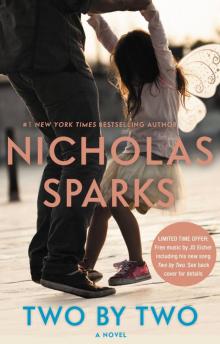 Two by Two
Two by Two A Walk to Remember
A Walk to Remember The Guardian
The Guardian Dear John
Dear John The Last Song
The Last Song The Lucky One
The Lucky One The Wedding
The Wedding The Longest Ride
The Longest Ride Safe Haven
Safe Haven The Rescue
The Rescue The Wish
The Wish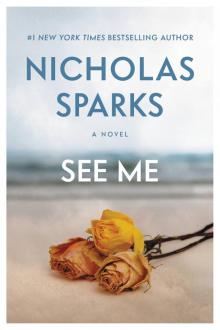 See Me
See Me Message in a Bottle
Message in a Bottle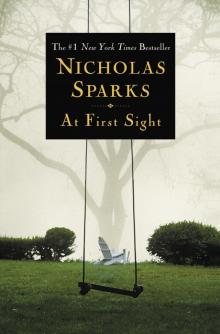 At First Sight
At First Sight True Believer
True Believer The Return
The Return A Bend in the Road
A Bend in the Road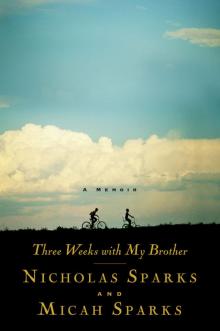 Three Weeks With My Brother
Three Weeks With My Brother Nights in Rodanthe
Nights in Rodanthe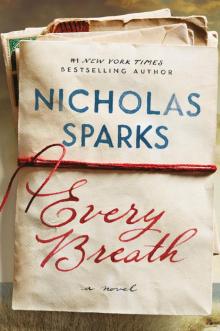 Every Breath
Every Breath